“Crossover”
Written by Peter Allan Fields and Michael Piller
Directed by David Livingston
Season 2, Episode 23
Production episode 40512-443
Original air date: May 15, 1994
Stardate: unknown
Station log. Kira and Bashir are returning from the New Bajor, the first Bajoran colony in the Gamma Quadrant, where they’ve set up a hospital. The conversation is awkward and ridiculous for a while, until they approach the wormhole. The runabout suffers a plasma leak; they enter the wormhole and there’s a flash of light—when they come out the other side, the station isn’t there. Kira finds it in orbit of Bajor. They’re intercepted by a Klingon ship. Two Klingon warriors board the runabout and point disruptors at them, but then turn into quivering masses of jello at the sight of Kira. They escort her back to the station, where they meet Intendant Kira, who’s in charge of Terok Nor (in orbit of Bajor) and her second in command, Gul Garak. Garak is surprised to see that a mere Terran like Bashir even knows Garak’s name, and Kira is particularly stunned to meet, in essence, herself.
Terok Nor is the Bajoran sector command post for the Klingon/Cardassian Alliance. Bashir is sent to the mines, while the Intendant takes Kira with her. En route, Telok, a Klingon, brings a Terran who was caught stowing away. Garak thinks he should be killed, but the Intendant sends him to the mines; however, Garak convinces her to let him interrogate him, since he probably had help.
Bashir is taken to an ore processor, where he’s introduced to the overseer, a shapechanger who looks just like Odo (but is never given a name). He is a brutal overseer, with “rules of obedience,” two of which Bashir breaks in fairly short order. Another slave in the room is O’Brien.
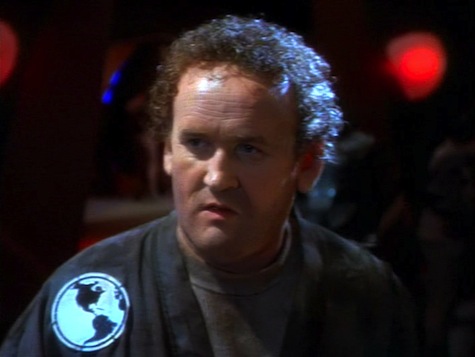
The Intendant brings Kira to her office and fills her in on the events of “Mirror, Mirror.” Then she reveals what happened next: bearded Spock rose to lead the Terran Empire, preaching reform, as prompted by the mainline universe’s Kirk, but his reforms left the empire vulnerable to the historic alliance between the Klingon Empire and the Cardassian Union. Since then, Terrans and Vulcans and other members of what we think of as Federation species are enslaved, and Bajor—which had been a subject world of the Terran Empire—is now an influential member of the Alliance.
There are also protocols in place in case another person crossed over from the mainline universe: they gimmicked the transporters so an accident like what happened in “Mirror, Mirror” can’t happen again, and anyone who comes from “the other side” is supposed to be killed. But the Intendant doesn’t want to kill Kira, and Kira plays on her vanity by saying that maybe the MU can influence the mainline universe this time, because her Bajor could use some influence from a Bajor that’s strong and powerful. She also tries to convince the Intendant not to kill Bashir—though she’s perfectly okay with him staying in ore processing for a while, as he’s arrogant and privileged and it would do him some good.
The Intendant has a Cardassian woman provide quarters for Kira, but she stops at ore processing along the way, and gets to talk to Bashir for a quick moment to fill him in (he’s already familiar with the Wikipedia entry for “Mirror Mirror” from the Academy). Then she goes to Quark’s Bar (now escorted inexplicably by a Klingon woman), and tries to see if he can get her a transporter. To Kira’s surprise, Quark’s price isn’t money, but the ability to send other people to her universe. Before they can finalize the deal, though, Garak enters and arrests him for assisting the Terran they caught earlier.
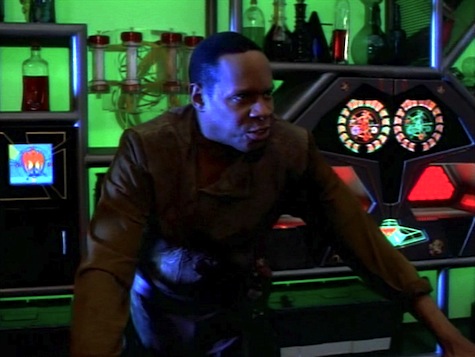
Then Sisko comes in with a ragtag crew, calling for the bartender. Upon learning that he’s been arrested, he smiles and says that drinks are on the house.
In ore processing, Bashir talks to mirror-O’Brien, who’s a tinkerer who keeps the machines running. Bashir tells him about his O’Brien, and then asks him about transporters. But O’Brien has no interest in helping Bashir.
O’Brien is then summoned to Quark’s by Sisko—who calls him “Smiley”—and he needs Smiley to fix his impulse engine. Sisko explains to Kira that he’s honored with a ship and a crew in exchange for collecting duties and tribute for the Intendant—who then summons him to her quarters to “report,” in truth for a booty call.
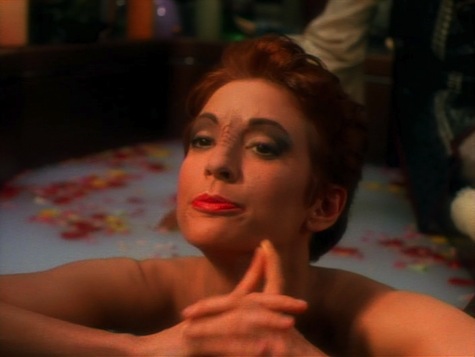
After said booty call, Kira is summoned to the Intendant’s quarters, where she’s having a post-coital milk bath. After dismissing Sisko, the Intendant asks Kira why she was looking for a transporter from Quark (he gave that up during his interrogation) and why she didn’t come to her for help. Garak and Telok then show up with Quark, who’s broken from torture. She sentences him to a quick death, as she doesn’t want him to suffer anymore. Then she squees like a schoolgirl about the party she’s throwing tonight and gives Kira a dress to wear.
Kira returns to her quarters with the dress, where Garak is waiting. He assures Kira that the Intendant will never let her leave, as she’s in love with Kira, her narcissism made flesh, as it were. He offers her a way home if she replaces the Intendant after Garak’s assassination of her that evening. Kira will spend a couple of weeks as Intendant to make it look good, then she’ll resign to explore her pagh (“or whatever”) and Garak will take over, leaving Kira and Bashir to go back home. Of course, if she declines, Garak will have the overseer kill Bashir.
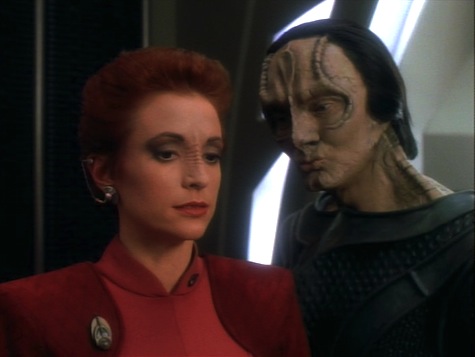
Now Kira has to accelerate her plans. She goes to the ore processor to tell Bashir to get out by any means necessary and get to the runabout, as the wormhole is their only option, since nobody in the MU knows about it. Kira then goes to Sisko, exchanging the intelligence that Garak is going to kill the Intendant for his assistance in getting her off the station. But the intel is worthless to Sisko—Garak has been trying and failing to kill the Intendant since he arrived at the station.
So she tries to appeal to his better nature, but that doesn’t work out so well, either. He’s made the best of a bad situation for him and his crew, and he’s content with that.
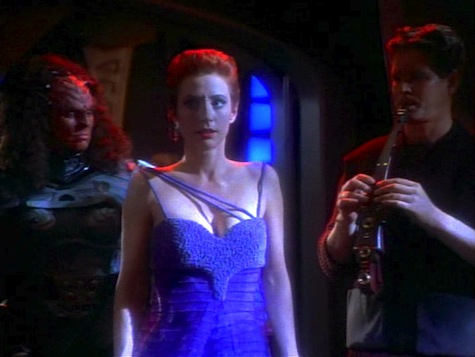
The party starts that night. Kira shows up, looking very delicious (and very nervous) in her blue dress, to Garak’s admiration. One of Sisko’s crew accidentally bumps into Telok, who backhands him and spits in his face, but Sisko silently convinces him not to stir up trouble, or use the knife he unsheathes. Before the confrontation can go any further, the Intendant shows up in the same dress (albeit with her tiara and a combadge).
The overseer’s villainous monologue telling Bashir that it’s his last night in ore processing is interrupted by a thorium leak (something Smiley warned him about earlier in the episode). Bashir takes advantage of the confusion during the evacuation to grab a phaser—and, in self-defense, he has to shoot the overseer, who then explodes into a mass of goo. He runs and takes refuge in the service crawlways—only to run across Smiley making repairs. In exchange for taking him along, Smiley shows him the way to the runabout—but Telok stops them and brings them to the party.
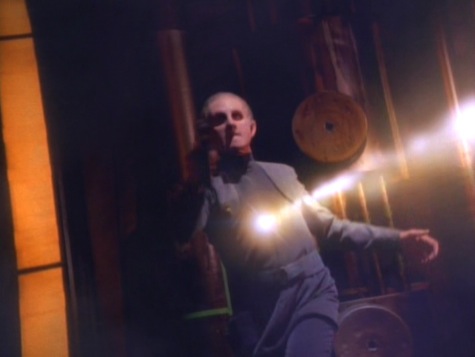
The Intendant is furious over the death of the overseer—no one kept order in the ore processor better than him, and he was the only one of his kind—and she sees this as evidence that she’s too lenient on Terrans. She will have Bashir and Smiley killed on the Promenade. She also asks Smiley why he did this, and he says that Bashir told him about a world where Terrans could be doctors and chiefs of operations. That’s a world he wants to believe in, and it’s better than what he has now.
But before Garak can take them away to be executed, Sisko finally notices that his gilded cage is still a cage, and he frees Smiley and Bashir (Kira also gets the weapon away from her bodyguard), and locks everyone in Quark’s. Smiley goes with Sisko, talking about maybe stirring things up, and get Kira and Bashir to their runabout.
A Klingon cruiser fires on them, but they make it to the wormhole, and they come back through to the right universe. Sisko asks where the hell they’ve been, and Kira, despite probably never having read Lewis Carroll, says, “Through the looking glass.”
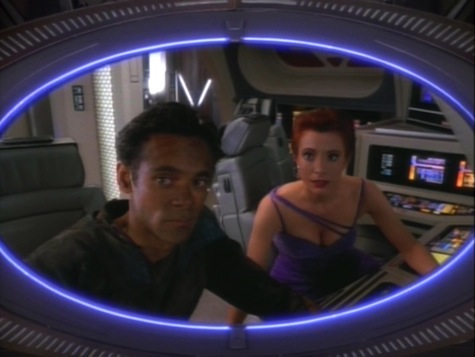
Can’t we just reverse the polarity? A runabout with a plasma leak going through the wormhole will send you through to the MU. Apparently. And the ion-storm-related alterations that were made to transporters in “Mirror, Mirror” apparently cannot be replicated thanks to changes made to transporter tech in the MU after that episode.
The Sisko is of Bajor. Mirror-Sisko is basically a pirate captain, a freewheeling, moody ne’er-do-well who obviously trades sexual favors for the illusion of freedom. The Intendant’s speech about how she’s too nice to Terrans obviously hits him below the belt (a place he’s used to her hitting, har har), and is the straw that breaks his back.
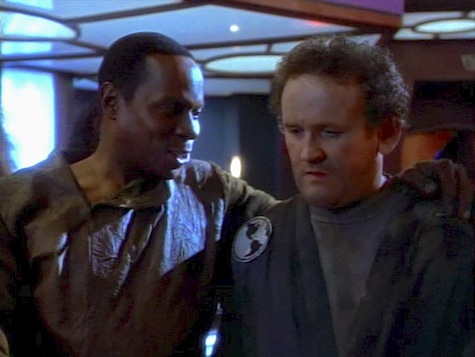
Don’t ask my opinion next time. The Intendant is sleek and sexy and mercurial and tyrannical and a joy to watch. Kira, to her credit, wastes no time in adapting to the new circumstances, and plays on the Intendant’s vanity and her own situation to try to get her freedom. (And there’s some truth in it. I like the fact that Kira finds the notion of a powerful Bajor appealing, even if it is wrapped in this awful universe.)
Rules of Acquisition. Quark is actually a nice guy in this universe, an altruist who tries to aid the Terran slaves. He’s caught and executed.
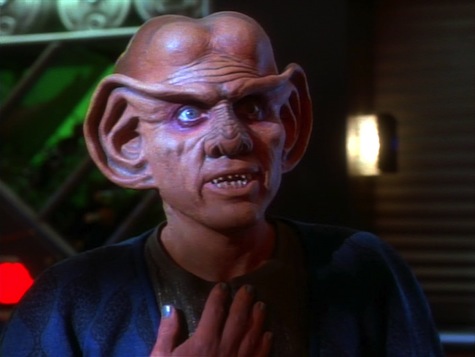
Preservation of mass and energy is for wimps. Odo’s counterpart has no name, and is a brutal, vicious overlord who has “rules of obedience,” an entertaining play on the Rules of Acquisition.
For Cardassia! In the MU, the Cardassians and the Klingons have formed an Alliance, which appears to now be the major power in the quadrant after conquering the Terran Empire that we saw in “Mirror, Mirror.”
Plain, simple. Gul Garak has similar charm to his counterpart, but none of the intelligence—indeed, his inability to make good on his ambition against the Intendant bespeaks an officer with the very lack of imagination that the mainline Garak has often accused members of Central Command of having.
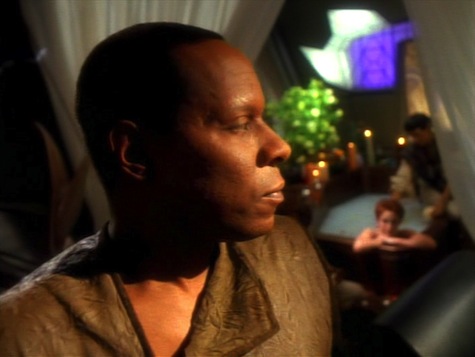
No sex, please, we’re Starfleet. Kira and Sisko obviously have a much different relationship in the MU, and the Intendant has no problem using seduction as a tool (she even uses it on Kira, kinda).
Keep your ears open. “Benjamin—did I hurt your feelings?”
“I never had any to hurt, Intendant.”
The Intendant and mirror-Sisko summing up their relationship.
Welcome aboard. Andrew J. Robinson returns as Gul Garak. John Cothran Jr. makes his second appearance as a Klingon as Telok, having previously played Nu’Daq in TNG’s “The Chase”; he’ll also appear in Enterprise’s “The Shipment” and the Star Trek: Borg CD-ROM. Stunt coordinator Dennis Mandalone makes a rare credited appearance as the member of mirror-Sisko’s crew who gets on Telok’s bad side; he’ll show up in most of the other MU episodes as well.
Trivial matters: This episode is, obviously, a sequel to the original series episode “Mirror, Mirror.” Except for the fifth season, each subsequent season of DS9 will have an MU episode. In addition, Enterprise will show some of the MU’s origins in the two-part episode “In a Mirror, Darkly.”
We don’t see mirror versions of Dax, Bashir, or Jake. The former two will show up in the next MU episode, “Through the Looking-Glass,” and “Shattered Mirror” will firmly establish that Jake doesn’t exist in the MU.
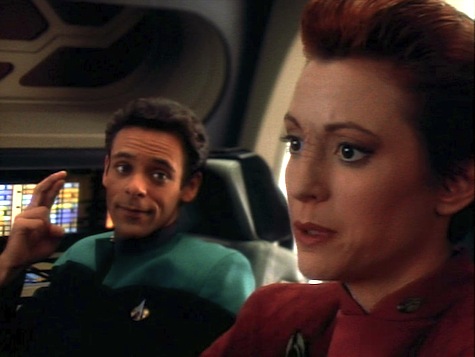
Telok at one point mentions working for the House of Duras and expressing concern about Lursa or B’Etor slipping a knife in his back—so, apparently, some things are exactly the same in the MU…
There were a couple of tie-in fiction follow-ups to “Mirror, Mirror” in the years between it and this episode of DS9: issues #9-16 of the monthly DC comic book in a storyline entitled “New Frontiers” (and collected in the trade paperback The Mirror Universe Saga) written by Mike W. Barr and the Diane Duane novel Dark Mirror, which featured an MU version of Captain Picard and the Enterprise-D. Both were superseded by “Crossover.” In the wake of this and subsequent MU episodes, tons of MU fiction was created: the backup story “Enemies and Allies” in issues #29-30 of Malibu’s DS9 comic written by Tim Russ and Mark Paniccia; Marvel’s Mirror Mirror one-shot comic written by Tom DeFalco; Spectre, Dark Victory, and Preserver, one of the trilogies in the “Shatnerverse” series of Kirk-focused 24th-century novels by William Shatner and Judith & Garfield Reeves-Stevens; the Dark Passions novel duology by Susan Wright; the Stargazer novel Three by Michael Jan Friedman; IDW’s Mirror Images comic book miniseres written by Scott & David Tipton; the Mirror Universe trade paperbacks Glass Empires, Obsidian Alliances, and Shards and Shadows, which included six short novels and a dozen short stories by a variety of authors (including your humble rewatcher’s Voyager novel The Mirror-Scaled Serpent and Klingon/Cardassian short story “Family Matters”); the post-finale DS9 novels Olympus Descending by David R. George III (in Worlds of DS9 Vol. 3), Warpath by David Mack, Fearful Symmetry by Olivia Woods, and The Soul Key by Woods; the New Frontier comic book Turnaround written by Peter David; and finally the MU novels The Sorrows of Empire and Rise Like Lions by Mack. The “Abramsverse” version of the MU is seen in a two-part story in issue #15-16 of the ongoing Star Trek comic from IDW, written by Mike Johnson.
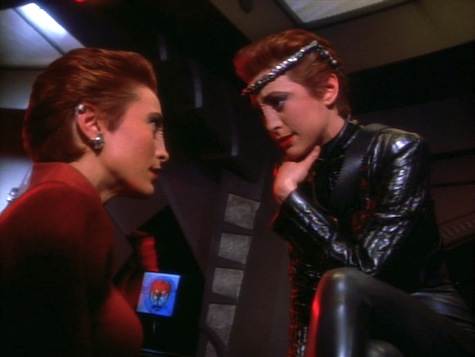
The Sorrows of Empire is notable for its reconciliation of the notion that Spock would allow the empire to grow weak enough to be conquered with the notion that Spock isn’t an idiot and should’ve seen that coming, especially since he saw the empire’s fall coming if things stayed as they were. Mack shows the fall of the Terran Empire as part of Spock’s audacious and long-term plan to bring about a true democratic and peaceful quadrant, which finally comes to fruition a century after his death in Rise Like Lions.
An early draft of the script had Worf in the episode, but Michael Dorn’s shooting schedule for the TNG finale “All Good Things…” made him unavailable. His lines were given to Garak, and the lines that Garak had in the script were given to Telok, who was created as a substitute for Worf. Ironically, Worf would appear in later MU episodes after Dorn joined the cast of DS9 in the fourth season as the Regent in command of the Klingon/Cardassian Alliance.
Director David Livingston cited the 1949 movie The Third Man as an inspiration for how he shot the episode.
This episode establishes that Bajor has set up a colony in the Gamma Quadrant, called New Bajor.
Rarely does an MU episode go by without a regular character’s counterpart being killed. This time ’round, it’s Odo and Quark.
Walk with the Prophets. “There’s got to be something better than this.” Ah, the once-a-year-thing episode. Some shows have bunches of these, where the crew goes to a particular place or a particular guest star makes an annual appearance. TNG had the yearly Q episode, the yearly Lwaxana episode, and the yearly Barclay episode. DS9 has already set up the yearly Zek episode, and now we start the trend of the yearly MU episode.
Like “Mirror, Mirror,” and pretty much every other “evil-universe” story (from Doctor Who’s “Inferno” to the comedy show Quark’s “The Good, the Bad, and the Ficus”), the notion that everyone would be in exactly the same place in a parallel timeline where everything’s evil strains credulity—and does so more here. In “Mirror, Mirror,” there’s some historical parallel development between the Federation and the Terran Empire, but there’s so much divergence here it’s hard to credit that the MU versions of Sisko, Garak, Quark, and O’Brien would all wind up at the same station (Kira and Odo’s counterparts’ presence actually makes sense).
But that’s the trope, and it wouldn’t be nearly as much fun to watch if the episode wasn’t filled with familiar faces. And man, everyone is having so much fun it’s hard to care too much about silly little things like making sense, or the trashing of the hopeful ending of “Mirror, Mirror,” or the fact that nobody can seem to agree on how to pronounce the word “Terran.”
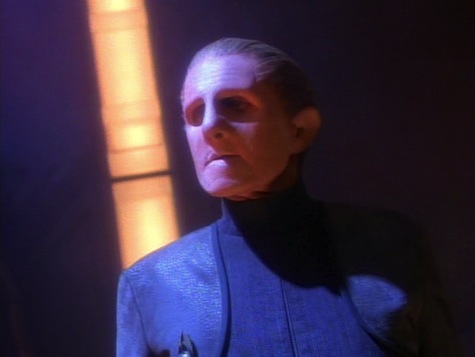
Most of the changes here are basic opposite-day type stuff: Quark is an altruist, Odo’s a total bastard (and man, does Rene Auberjonois have fun with it, as the only thing missing is a mustache to twirl), and Garak is a boor. In an amusing touch, O’Brien’s pretty much the same guy, only more beaten down.
Where the episode shines is in its two leads: Avery Brooks tackles the role of pirate captain with gusto as someone who is generally batshit crazy. Brooks hasn’t been this entertaining since Spenser: For Hire went off the air. And Nana Visitor is superb. The only person who has to play both versions for an extended period, Visitor does an amazing job playing off herself. This is the second time Visitor’s gotten to go all sex-kitten on us, the last time being “Dramatis Personae,” and it’s fascinating to see how much of the Intendant there was in the role Kira played in that first-season episode. The Intendant is a magnificent villain, one whose appearances are always a welcome diversion.
Yes, the plot’s straightforward, but the point of episodes like this is to give the actors a chance to play around a bit, and this cast is more than up to the job.
Warp factor rating: 7
Keith R.A. DeCandido’s next foray into Trek fiction will be The Klingon Art of War, out next spring (first look here at StarTrek.com). His latest work is Ragnarok and Roll: Tales of Cassie Zukav, Weirdness Magnet, a collection of urban fantasy short stories (read an excerpt from one story right here on Tor.com).










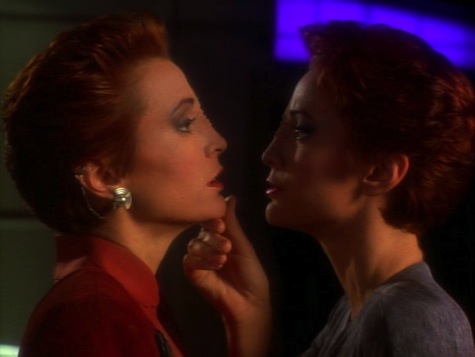
I don’t know that Dark Mirror and the other earlier tie-in fiction were necessarily “superseded” by this episode. We are, after all, talking about parallel universes. Whose to say that the universe visited by Kirk and co. didn’t spawn at least two parallel universes: one where Spock succeeded in reforming the Terran Empire but the Klingon/Cardassians conquered them, and one where he failed and the Terrans conquered everything leading to the universe from Dark Mirror. That’s always been my theory at any rate (I liked Dark Mirror), and I’m sticking to it.
I’m not sure I really like MU episodes because everyone acts so different but all the actors are having fun. It takes me a little time to go with the flow for opposite day.
I have always loved the mirror universe episodes. They led to the awesome Mirror Mirror expansion in decipher’s Star Trek CCG!
I mostly agree about Intendant Kira being an effective villain, but the treatment of her sexuality bothers me somewhat. It plays too much into the “sex = evil” stereotype, and particularly into the “gay/bi = evil” stereotype. It wouldn’t have been so bad if they’d established that our Kira was at least potentially bisexual herself, but they instead played “good” Kira as strictly hetero while “bad” Kira would screw anything that moved, and that has some unpleasant implications.
But I did like it that the Intendant really believed she was being kind to her subjects, and regretted it when she “had to” punish them for their “betrayal.” Although I just now realized that they did pretty much the exact same dynamic with Dukat when they examined his tenure as prefect of Bajor.
DS9’s take on the Mirror Universe was an interesting twist — the idea that Kirk’s interference had unintended consequences — although I suspect it was probably more about telling an MU story that would be relevant to DS9’s politics and races, hence the shift of power to Bajor and Cardassia. It is clever giving Mirror Bajor the prosperity Kira wants for hers. But it’s a bit odd that M-Bajor was a protectorate of the Terran Empire in the 23rd century, well before the Federation contacted it. I guess the explanation is that the Empire expanded much faster and more forcefully than the Federation did.
One thing that disappoints me, though, is that a few years before this, I’d read in Starlog that Jerome Bixby, writer of “Mirror, Mirror,” had pitched a sequel to TNG, called “Broken Mirror” IIRC, but it was rejected. It’s a shame that the person who created the MU didn’t get to bring it back. It would’ve been interesting to see what he would’ve done with it.
I never found Mirror Sisko’s change of loyalties very convincing. He went from heartless pirate to freedom fighter far too abruptly. Maybe Avery Brooks sold the former a little too well.
@1: The problem is that Dark Mirror and “Crossover” contradict each other about events in the Prime Universe as well. In DM, the events of “Mirror, Mirror” were classified by Starfleet and the Enterprise crew needs to request clearance to access thefiles, but in “Crossover,” it’s apparently routine knowledge taught at the Academy. Also, DM posits that if a starship-sized amount of mass from one universe/timeline spends too much time in another one, it will create a disruption sufficient to destroy most of the galaxy — which was pretty clearly disproven by ENT: “In a Mirror, Darkly” and the 2009 movie.
But that’s okay. They’re all just make-believe anyway, so it doesn’t make a story less enjoyable if it doesn’t fit with another story. It’s just an alternative interpretation of the ideas, a different variation on the theme.
@CLB I kind of agree with what you’re saying about playing the Gay/Bi=evil thing. As a member of the LGBT community myself, I find that a little annoying but generally can look past such things. Like in Buffy the Vampire Slayer when they had their alternate Sunnydale overrun by Vampires; Willow was “Kinda gay” as she put it. But, later on in the series (as was the brilliance of Joss Whedon’s and his team’s writing) they called back to that and actually made Willow realize she was a lesbian. That being said, as much as I like alternate timeline/parellel dimension stuff, I’m not a big fan of the Star Trek Mirror Universe. Every time one of these episodes comes up in the DS9 playlist, I skip them so fast. I get that it gives the actors some room to stretch their legs and I appreciate the need for that, especially when they are playing the same, sometimes rigid, characters for so many seasons. But could it have been so hard to make the characters memorable instead of just dumb versions. None of them are particularly smart in the MU. When Worf shows up later, he’s kind of a numbnuts too, just as Garak and Kira are here. As far as how the episode was made and all that, it was good. Being that it was a MU ep, not so much.
I liked “Mirror, Mirror,” as much as anyone, but I find that it’s sometimes hard to get through all the DS9 ones (or even “In a Mirror, Darkly”) despite some very good characterizations and moments. It’s almost a feeling of it being overdone.
And while it can be fun, yeah, it doesn’t make very much sense. Not only that the mirror versions end up in the same place, but the fact that they even exist. In this completely opposite universe, all the same people are coming together at precisely the same time (same egg and sperm) to make the same people. And then they are even given the same name. In “Mirror, Mirror,” and in this episode, it’s established that the characters are having sex with characters they would not have in the main universe. So why not NOT having sex with people they did in our universe? Especially since some of the mirror episodes show characters getting killed in the MU that weren’t killed in the good universe. And then you have this universe where the culture is so evil and different that people are getting named the same thing…Instead of “James Kirk,” why not name your kid, “Suncrusher”?
That being said, I think the DS9 mirror episodes present a very interesting take on the MU. In “Mirror, Mirror” and even in “In a Mirror Darkly,” it sets it up as the people just being really evil versions of themselves. But with the Terran resistence seen in DS9 and Mirror Sisko’s sudden change, it’s almost suggesting that these more or less people with the same potential but surrounded by different situations and an evil indoctrinating culture. That has some implications in the sense that everyone (Kirk, etc.) is just buying into the evil culture.
I’m another who really likes “Mirror, Mirror”, but isn’t really wild about DS9’s take on the whole thing. Looking at it now, I’d say that the Intendant’s sexual “decadence” is part of the modern tendency to attribute all sorts of sexual weirdness on the part of the worst of the Roman emperors. When it first aired, that didn’t occur to me, but now I’m mostly bothered by the bi/gay = evil thing, like some of the others.
By coming up with a new story in this universe every year, they really got into trouble trying to top the previous episode. About the only decent storyline they got out of it was confronting Sisko with the MU version of his late wife, and that fell rather flat.
Also, having a character named Telok on board a place called Terok Nor wasn’t the smartest idea.
I don’t agree that there’s nothing in the plot – I think this ep quite powerfully addresses the ‘what if’ scenario. Not just in the fact that this universe exists, but the characters themselves discuss the issue, especially O’Brien. He’s the one inspired by the alternate Bashir to think about the different ways life might have gone, in some quite touching scenes.
I think that actual substance is what was lost from later MU episodes. They really did increasingly become comic book episodes that are just excuse for everyone to dress up and act different. But this one actually had something about it.
re Sisko’s change of heart: I’m not so sure it’s as sudden as people are saying. I think it’s clear that he’s not happy in his life under the Intendant, but he’s also selfish and unwilling to endanger the comparatively comfortable life he’s got. I think he wanted to break free, he had been just assuming there was nothing he could do about it. The desire to rebel had always been there, it was just the understanding that it was even possible that was new.
re gay/bi = evil. I would agree that that’s a troubling trope, but I don’t think that it even what’s going on here. The Intendant’s relationship with Kira is about narcissism, not lesbianism. It’s not about there being another woman, it’s about there being another Kira. I think later episodes’ ‘evil lesbian’ moments are a misreading of the intentions of this episode. But, if there must be an explanation, in the MU sex is used as currency, persuasion, punishment, stress relief, and only in very exceptional circumstances as actual intimacy or romance. Since it means nothing to her, it doesn’t matter if she is doing it with a male or female.
re Jake: I always found it a strange omission that no episode or book ever introduced MU-Jake. I know that Sisko didn’t think he existed, but it was clear that MU-Sisko and MU-Jennifer weren’t an especially close-knit couple, so it’s not a huge jump to think that Jennifer got pregnant, gave the baby up for adoption or something, never told Sisko about it, and he could show up unexpectedly later on. It doesn’t have to happen, and there’s something poignant about a person we know simply not existing, but it seems like an obvious story idea that I’m surprised no-one ever pitched.
I remember LOVING the opening scene of the book Fearful Symmetry, where it is explained that the Rio Grande’s crossover via the wormhole was no fluke, but that the Prophets wanted them to crossover for their own purposes. It practically rewrote the entire show for me in the course of one scene by explaining that these two storylines that had seemed completely separate – the Prophets story and the MU story – were in fact the same storyline. That blew my mind.
This episode also begins the grand tradition of the Intendant killing a Ferengi in every MU ep (except for “Resurrection” I suppose). Quark, Rom, Nog, Brunt and even Zek get done one by one.
What I loved about this episode was that it was Deep Space Nine doing Blake’s Seven (with a better budget!). Sisko is Blake, of course, Kira is Servalan, and Smiley is Vila.
In reference to Intendant Kira’s sexuality: Nana Vistor has also commented on that. The orginal idea in this episode wasn’t that she was bisexual. In Vistor’s words (from DS9 Season 1 DVD Special Features via Memory Alpha:
Also, from Star Trek: Deep Space Nine Companion, also via Memory Alpha:
@8: Re: Sisko, you may be right, but the episode didn’t do a good job selling that impression, so his “face turn” seemed arbitrary.
Re: Kira, you’re right — in “Crossover” it was more about narcissism. But in the later episodes, as you acknowledge, the Intendant was clearly played as bisexual, and that was what bothered me. Your justification makes sense, but it doesn’t change the fact that the producers should’ve been more careful to avoid a stereotype. Either clarify that the Intendant wasn’t bi, or — better yet — establish that our Kira was.
I never saw her as bisexual later on.
My perception was that M-Kira truely loved Kira, as Kira was the only and only perfect mate for her. This is something that everybody seems to agree on.
With others, I think she didn’t see men or women as beings, but rather as toys existing only for her pleasure. Men, women, androgynous J’naii – M-Kira wasn’t hetero-, homo-, bi-, or even pan-sexual. Such an assertion would require her to see the other party as a patner. At the risk of using Earth-normative terminology, she dehumanized them. I’d consider her asexual – she engaged in the activity solely to her benefit and to her whim. She was just using another creature’s body as a tool instead of an inantimate toy. That she was using creatures in this way makes even more sense when you consider that it would be an opportunity to exercise power over them. It’s one thing to contol my phone, it’s another thing to control a sentient creature.
Looking at Kira, this was one of the big differences between the two. Whether Bareil or Odo or anybody else she cared about, her relationships were built on her willingness to self-sacrifice for them – her mates were her partners and she cared about them. I think she showed flashes of hunger for power (for Bajor or a Bajoran agenda, not for her personally), but even these are hard to recall.
I don’t think either of the two Kiras were bisexual. One was hetero and the other didn’t care about gender.
@12: Again, that’s a handy rationalization, but I still say the writers inadvertently portrayed the Intendant in a way that looked like it was reinforcing the “evil lesbian” stereotype that was still quite pervasive in the media at the time these episodes aired. So they should’ve handled it differently.
I defintiely took it as more of a narcicissm thing…although probably there was a dash of evil=decadent/no self control, which people then assume must mean that a person will just have sex with whatever moves regardless of gender, and that bisexuals are just bisexual because they want double the sex (an unfortunate assumption).
“And man, everyone is having so much fun it’s hard to care too much about silly little things like making sense” – overall, that’s how I felt. I had the same thoughts as crzydroid about how hard it was to swallow that this world is SO different, but yet everybody’s ancestors and parents still apparently came together at precisely the right time to produce the same people with the same names. It reminds me of the opening to Bill Bryson’s A Brief History of Nearly Everything.
Still, it’s fun. In my mind it’s more of a fun what-if, alternaverse kind of thing.
“he’s already familiar with the Wikipedia entry for “Mirror Mirror” from the Academy”
Love this bit.
@12, I’m sure you didn’t mean to word it a way offensive to anyone, but that’s a really inaccurate use of asexual. I guess you’re saying her motives are not sexual, which I also can’t completely agree with, but it’s such a minor point in a completely ridiculous and silly episode. Overall seeing the MU was fun, but I’d have a hard time watching it again. I wouldn’t have given this a 7. They really overdid it with the MU eps. On the other hand, this kind of episode is one reason DS9 seems more like TOS than TNG ever did.
After VOYAGER and DS9 finished I was hoping for a STAR TREK: EMPIRE show with underdog humans fighting for their freedom, but instead we got ENTERPRISE.
And thank god for that because Enterprise was good, could have been better though, if not for all the fans bitching about what should and should not be included and why Scott Bakula’s hair looked like that and oh, that’s not cannon and oh, look at that, that communicator is more advanced than Kirk’s and blah blah blah lol. To each his own though.
@18 Blaming the fans for the quality of a TV show is like blaming the witness to a crime for committing it. Absolutely none of the people watching Enterprise was in a position to make it any better; if they were, it probably would have been.
And, for the record, those fans who complained… were correct. ; )
I agree with @8 about Kira’s sexuality- she is pure and simple a narcissist, and her later bi- flings may just be a tool of narcissism more than anything else- she just wants to be worshipped and doted upon and pleasured, and isn’t very specific as to whom does it.
One thing which I thought of in regards to Kira’s hetero focus in the main universe is that the normal place is a much more religious Bajor (the Sorrows of Empire timeline establish’s that the the Bajoran religion is pretty much beaten into hiding). It is possible that main-Kira is actually bi but due to her religious upbringing rejects that side of her sexuality. Absolutely no proof of this, but it could be a contributing factor.
I do like the crossover episodes if for no other reason than they seem fresh- we see each actor portray different facets of themselves in a way that doesn’t seem contrived (What if the crew is possessed? What if the crew is psychically manipulated?) because this isn’t our normal crew- it’s an entirely new set of people who just happen to look like our crew. What is interesting is that this episode follows so quickly on the heels of the Maquis, which is about a group of humans rebelling against the governments. In those episodes the humans are reviled, in this episode their heros. I realize what they are revolting against is different, but it’s indeed an interesting point.
KRAD’s right- this is a completely implausible timeline (not so much the scenario as it is that all of the people are there) but it is an awfullly fun romp.
@20: No, “Rejoined” makes it clear that Kira has no sexual-orientation prejudices at all. Once it becomes clear that Lenara Kahn is Dax’s ex-wife from an earlier life, Kira says “One thing I don’t understand is why Dax and Lenara can’t just pick up where they left off. I mean, if they’re still in love with each other.” The fact that they’re both female is a complete non-issue for her (and for Bashir, who explains the issue purely in terms of Trill not associating with former hosts’ spouses). Clearly she believes that being in love is enough to justify becoming lovers, regardless of gender.
One nit about “Welcome Aboard”: It’s Dennis Madalone, without the first n.
@19 I never said that the fans were in any position to make it better and I never said that the only cause of the quality. Plus, those that complained being right is a matter of opinion so you cannot serve it up as fact. What I was saying was, besides studio inerference in the show, the fan’s of Enterprise and the Trek Cannon Fanatics all began to complain about how this wasn’t right and that wasn’t right; the phasers look too modern, the communicators look more advanced than Kirk’s and so many other things that the writers, needing to do something, began doing dumb things like adding in a Borg episode and then trying to make the third season like DS9 with a long story arc (though I lked that season). So yes, it was studio interference and it was bad ideas by the writers of the series…but the fans must take some of the blame for being prissy whiners who complain about everything up to and including the theme song.
Yeah, Matt I agree with you. I always felt that Enterprise was much better than Voyager. I guess I’m one of the few. Back to this episode, I tended to like most of the alternate universe episodes. That being said I didn’t like the Sisko conversion – it seemed like something was missing on the cutting room floor that would have made it more palatable to me.
@23 if those of us who didn’t like Enterprise don’t get to present its lack of qiality as a fact, you *certainly* don’t get to present our alleged responsibility as an imperative. Back off a little, please.
And neither of those things has much to do with this episode.
I have to admit, Keith, a lot of your ratings this season have surprised me. An episode that you seem to say is pretty solid can still end up with a 5; and an (admittedly enjoyable romp) with substantial holes in it ends up a 7? I know, I know, the number’s the least important part of the review, but this is the 3rd or 4th time this season where I’ve felt the number doesn’t match the review above it.
I thought the “looking glass” comment from Kira was a little odd, but then I decided she’d been talking to Bashir about it, and I can easily see him bringing it up. Flimsy rationale, perhaps, but I’ll take it.
As an unabashed Kira fan, the Mirror Universe episodes always made me tingly when I watched these growing up….
This was probably the first time I thought a technobabble explanation for going back in time/crossing universes/etc. seemed insanely weak. Normally I don’t bat an eye, but here we get some plasma leak inside the wormhole, and we’re suddenly in a different universe that nobody’s seen in forever. As many ships went through that wormhole, you’d think there’d be ships heading into the MU at least once a week.
This started to be kind of a theme for DS9 (when the Feringi were in an accelerating spaceship with some kind of different cargo, I immediately knew they’d be going back in time).
Low bar, that.
Folks, the rewatch for “The Collaborator” won’t be until Wednesday. I need to finish writing an adventure for the Firefly Role-Playing Game that’s coming out next spring….
—Keith R.A. DeCandido
“I need to finish writing an adventure for the Firefly Role-Playing Game…”
:O
Want!!
The difference between being a writer and the rest of us. Keith says: “I need to finish writing an adventure for the Firefly Role-Playing Game that’s coming out next spring….” and it’s a perfectly valid excuse. I go to my boss tomorrow and tell him I can’t get my assignments in because I’m wrigin an “adventure for the Firefly Role-Playing Game” and see how well he takes it.
MikeK:
I certainly take it badly. I have very simply requirements of Mr. DeCandido: that he should provide me DS9 reviews, or such other reviews as I suggest, that he do so in a timely maner, and that he never permit issues of career, family, health, friendship or personal hygene to interfier. And I’m certainly not unreasonable; if he needs special time off, he nearly needs to ensure that he begins the process no later than two years prior to the date/hour during which the assigned tasks will be difficult.
However, given his lacksidasical behavior lately it is clear that I must deny him some of the extrodinary wages with which I have been providing him. Sadly, in the event that this does not have the desired result, it will become necessary to either suspend or entirely take away his birthday.
At the risk of losing my birthday, I just inform y’all that the rewatch if “The Collaborator” will not go live until 11am Thursday.
—Keith R.A. DeCandido
@13 – By default, I have to agree with you. Unfortunately, I didn’t back DS9 when it first aired and don’t remember what the television environment was like at the time. To whatever extent, my view is colored by my perceptions of society today. Without a proper consideration of context, it is unfair to ascribe current connotations, positive or negative, to the episode – in this case, I must withdraw my neutral/positive view of this aspect of the episode.
@20: Aside from Christopher‘s point about Kira’s views on sexuality as an individual, I also don’tthink the mainstream Bajoran religion has ever been portrayed as restrictive in that way. We know vedeks are at liberty to drink, marry, have sex and even gamble. None of that is considered antithetical to a spiritual calling (which is as it should be). Maybe, possibly, kinda-sorta I could see it being more of an issue in the era of the d’jarras, when life roles were more strictly defined, but I imagine that would have been given up during the Occupation just like rest of it.
re Trill sexuality. I would still presume that as humanoids, Trill hosts are hardwired for one form of sexuality over others. But the presence of the symbionts woukld inevitably blur that line because they provide access to memories of all variations. And while joined Trill may be the minority, I assume that attitude would trickle down socially to the unjoined masses as well.
Jadzia has opposite sex relationships and was willing to have a same-sex one. Ezri has both, if we count the MU. For that matter, MU-Ezri is without symbiont, so she may be hardwired gay and it’s only Dax’s memories of Worf and Bashir that push her to them. Crap, then there’s Brinner. Oh well. Okay then, let’s say love in the MU is hard to come by and they’ve learned to accept it wherever they can find it.
A five? A FIVE? This is among the worst Star Trek episodes I’ve watched yet. The fact that there are more coming is painful to me. The only episodes that I can clearly remember being worse are The Empath from TOS and the one with the kids from TOS. The entire thing is convoluted BS, and boring as all hell for the first 25 minutes. I almost skipped it with 20 minutes left, which would have made it the first episode I skipped in my grand first time viewing of every Star Trek episode I’m currently embarked on, but I powered through it on sheer willpower (to be fair, the last 10 minutes were better than the preceding 30). I really think that the benefit of hindsight having viewed other mirror episodes or something is at play in making people sympathetic to this episode (maybe with repeated exposure it becomes “accepted practice,” but I defy the thought). It was really, truly awful. Maybe it’s just a matter of my standards being higher with DS9 episodes than TOS, but I would rather watch the episode with the space hippies (This Side of Paradise) or the episode with Beverly Crusher falling in love with the family alien than this garbage. At least the former had one of my favorite lines in Trek to date (“Crack my knuckles and jump for joy, got a clean bill of health from Doctor McCoy”).
I know the rating is the Least Important Part of the Review™, but I’m not letting you hide behind that old saw this time Mr. DeCandido! This time, it’s on!
Roger: the space hippies episode was “The Way to Eden.” “This Side of Paradise” was the one with the spores that made Spock (and everyone else) all goofy.
—Keith R.A. DeCandido
Let me begin with saying I love mirror universe episodes. They are fun bits off fluff that usually break up some pretty heavy storylines. You know there will be no real repercussions in the real universe and it’s fun to watch main characters fall like dominoes. But I am going to be in the minority (at least after reading all of these comments) in saying this was a terrible episode. Let me start with the basics, why on earth would a Bajoran be running things? I’m pretty sure I could have drunkenly conquered Bajor by myself with an unarmed runabout by showing them bad card tricks. I find it very difficult to think that the Cardassians and Klingons would have any use for them except, maybe, for food.
There was so much hammy acting I would have sworn it was Easter. Sisco and Kira overacted so badly it was annoying. I know this is supposed to be where the actors stretch their legs and just have fun, but really. This was just a mess.
@39/doompaul: I think you’re forgetting that TNG: “Ensign Ro” established that Bajor was an ancient civilization far, far older than any on Earth. And “Explorers” established that they were in space centuries before the Cardassians were. They only seem weak in TNG/DS9 because we’re seeing them after half a century of being beaten down and stripped of resources by the Cardassians. We don’t know how hard it may have been for the Cardassians to conquer them in the first place, since we only see the aftermath. (Although the Terok Nor novel trilogy, portraying one possible version of those events, shows it as a gradual process of winning and then betraying the Bajorans’ trust, IIRC.) In the Mirror Universe, Bajor was occupied by the Terran Empire and liberated by the Alliance decades before “Crossover,” so they’ve had generations to rebuild and restore their strength and influence, while Bajor Prime is still just at the start of that recovery process.
Well, I can’t argue with that logic.
I enjoyed the episode, but I thought that having Intendant Kira be a hedonist dominatrix was a cheap way of making her different to original flavor Kira. Not to mention what Chris says in comment #4.
Also, Quark is also a nice guy in our universe, we’ve seen he aided Bajorans during the occupation, and not specifically for profit.
You know what the MU was missing? A truly good, altruistic Dukat.
And regarding Enterprise, I enjoyed the show, and I can understand that some fans didn’t. What I can’t stand is the need for many of those fans to bring up how awful they think the show was in conversations that are not about Enterprise.
8: Zek didn’t die in The Emperor’s New Cloak. 42: In TENC, Rom mused that perhaps Dukat was Federation President after seeing the role reversals that go on in this crazy MU. We get another scene with Bashir in a Runabout annoying the hell out of his companion. These are becoming a yearly thing as well, KRAD.
I just don’t like Mirror Universe episodes. The reasons have already been stated numerous times in the comments: Everyone and everything in the same place, the language is the same, the names are the same and they name things the same. Even the universal translator still works fine, and of course everything in the “evil” universe is basically evil… I just can’t enjoy those kind of episodes.
That being said, yes Nana Visitor’s performance as both good Kira and bad Kira is awesome.
@44/waka: “Even the universal translator still works fine […].”
If it’s universal, it should work fine.
“[…] and of course everything in the “evil” universe is basically evil…”
That, at least, wasn’t true in the original “Mirror, Mirror” episode (the only Mirror Universe story I like). It wasn’t an evil universe or a universe of opposites then, only a universe with a different Earth future history.
@45/Jana: That’s still the case in DS9 too. Everything is still an outgrowth of the rise of the Terran Empire in place of the Federation. The Empire conquered Bajor and warred with the Klingons and Cardassians (we now know from Discovery that they conquered and devastated Qo’noS), so the K&C formed the Alliance to conquer them back, and the devastated Bajor joined them and became strong and vindictive. And like so many victims of abuse, they became the abusers, just as tyrannical to the Terrans and others as the Terrans had been to them. And growing up in that darker context is what led the characters to follow darker paths.
Consider Dr. Jekyl and Mr.Hyde. You could tell that story as being about two different parts of the same person, or you could tell that story as being about two different persons in different universes that somehow “mirror” each other. One way I think focuses attention on the internal dynamics or relationship between the two parts; the other way I think is likely to focus on context, on how that “part” is an adaptive response to that universe.
“In another reality, I could have called you friend.”
@47/Keleborn: I like to compare “Mirror, Mirror”to The Allegory of Good and Bad Government by Ambrogio Lorenzetti.
@48/JanaJansen,
Interesting! I hadn’t known about that one, had to look it up on Wikipedia. And while we’re speaking Italian, there’s something I’m curious about. On the Region A (NorthAmerican) Star Trek TOS Blurays, you can select for the audio to be in English, Spanish, or French (and possibly Portuguese) IIRC. What I’m wondering is if the European Versions have Italian available. I’d really like to hear what Kirk’s rousing speech about “Risk! That’s what this ship is about! That’s why we’re aboard her!” from Return to Tomorrow sounds like in Italian. :)
PS: On the subject of good government I like Tao Te Ching #38.
@47/Keleborn: People take the term “Mirror Universe” way too literally. It was never about direct opposites, just about a skewed parallel. The title “Mirror, Mirror,” after all, comes from Snow White, and is about a mirror that always reveals the truth about people. The truth here being that humans always had the potential for savagery within them no matter how well they controlled it, and that we could’ve had a far worse future if things had only been a little different.
@49/Keleborn: My DVDs offer Danish, Dutch, English, Finnish, two kinds of French, German, Italian, Norwegian, Spanish, and Swedish. Do you want me to make a sound recording of Kirk’s speech in Italian?
@51/JanaJansen,
My goodness! How would you do that? Can you link to an audio segment? I’d love that! And yes, specifically Italian, and just a bit of that speech.
(That speech seems to be widely considered to be over-the-top, but I happen to think it is just slighty over the top, in his nonverbal expression at the moment he says “Risk!” But I’m betting that in Italian it really will sound over the top.)
@52/Keleborn: No, I can’t link to an audio segment. I had something rather primitive in mind: I could play the DVD and make a sound recording with my mobile phone, then send you the resulting file via email, or Facebook, or WhatsApp – whatever suits you best. If you’re interested, just send me a message on this site.
@53/Jana: Wow, I feel old now. For me, “primitive” suggests something more like recording the sound off a TV set with a portable cassette recorder. (I never did that, but once in my teens, a classmate played an audio recording of “Miri” for some other classmates. And fans recording audio off the TV is the only reason the soundtracks to the erased early episodes of Doctor Who still survive.)
@54/Christopher: You’re younger than I am, but I have kids who teach me all the fancy stuff.
“[…] recording the sound off a TV set with a portable cassette recorder.”
I did that! I had all of TOS on cassettes – well, all the 39 episodes that were shown on German TV back in the day. Everybody had to be really, really quiet when I did my recordings, and everybody actually complied, even my parents. I had very understanding parents.
@45 JanaJansen: But it’s a different universe. Why would anyone in a basically evil universe invent a universal translator instead of forcing everyone to learn your language if they want to communicate with you?
I mean, they can’t even afford to feed the slave workers with proper food even though they can replicate food for free? And why are there mine workers ON A SPACE STATION?!
@55: Lol, I would record things off the TV with a cassette recorder when I was young, too (from german TV as well ;))
As for getting sound off a DVD, it’s easy if you have a DVD drive in your PC. There are programs that can extract the sound for you.
@56/waka: Why do you think that it’s the universe that’s evil? I don’t think that universes have metaphysical characteristics like that in Star Trek (or real life, for that matter).
I can’t answer your other questions because I don’t care for this episode, only for the original “Mirror, Mirror”.
As for the DVD, that’s what I meant when I said “primitive” – I know that programs for this exist, but I don’t know any of them, so I would do it the old-fashioned way (did do it, actually).
@56/waka: It’s not a “basically evil universe,” it’s a universe where Earth in particular took a darker path, and everything else was the same up until it was affected by interaction with Terrans. Surely humans aren’t the only civilization who ever invented machine translation. The Vulcans in First Contact seemed to understand the folks in Bozeman, Montana pretty well, suggesting they already had the technology, even though they didn’t share it with Earth and required them to come up with their own version.
@58 The Vulcans obviously had UT tech by 1957, that is canon (probably, depending on how much T’Pol was yanking Duchess and Catfish’s chain).
“I don’t like, Miles! That’s why I named you, ‘Smiley’!”
I had a lot to say about this episode, but it was all summed up in Walk with the Prophets.
However, I can’t pass up the chance to say that I love how most of the the Ferengi in the MU are depicted as Hu-mon-itarians!
Lockdown rewatch. The Mirror Universe stuff was great fun throughout the series I don’t think there was ever any great weight to much of it but the cast clearly really enjoyed playing it and I found it an enjoyable breather at times from the darker stories later in the series. I always thought Alyson Hannigan must have Studied Nana Visitor in the Indendent role role when playing the Alternate Willow in Buffy the comparison is uncanny at times.
Mark me down as another viewer who enjoyed Mirror Mirror and became rather disenchanted by the whole MU thing the more it was used. By the time Discovery was dragging us back there for the second time, it was downright boring. It makes going back and watching these early MU episodes more of a chore than even a guilty pleasure.
I’d have liked to see acknowledgment from Bashir that (a) he killed someone and (b) it was Odo’s counterpart.
The site redesign is awful. Comments are a stone-cold bear — you have to keep loading them to read all, then scroll back up if entering your own; also, words are bizarrely split in the middle of “carriage returns” in the justified text; also also, I can’t find any way to preview before posting. Episode links within posts are broken, too, and I’m ticked that all the rewatch links are no longer available on one page.